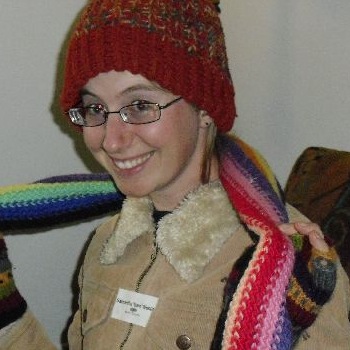 The ideas of civilization and the acts of colonization that seek to domesticate and control that which is inherently wild and good in God’s creation, depend on a mass of binaries—complexities of the natural and social world systemically and robotically reduced to digestible “opposites”. The opposites—male/female, straight/queer, white/black, rational/erotic, human/animal, among others—are assigned values in ways that serve to justify domination. Hierarchy first splits, then ranks; in the aforementioned set, it is clearly the first part of the binary that has been valued and the second that has been devalued. As those who identify in some way with the Judeo-Christian tradition, we belong to a legacy that has participated in the construction of a dominant culture that legitimates these binaries and therefore devalues sexual and gender multiplicity, non-white peoples, non-human animals, women, the erotic, the body and unmediated creation in general. The oppression has been naturalized by the nation-state and claims of divine ordination. We also, thankfully, belong to a legacy of renewal, re-wilding, resurrection and total liberation. This is what we hope to reclaim and understand together. We believe this process involves examining and dismantling all aspects of ourselves and our world that have been infected by the logic of civilization, including our sexuality. There are, of course, myriad places to look to witness the ongoing effects of colonization and its civilizing projects. Sexuality is one area that often goes uninterrogated, especially by Christians, and, we’ve noted, by green anarchists or anarch@-primitivists. We understand colonization and its civilizing projects to be fundamentally about controlling sexuality—sexuality of indigenous peoples, of colonizers and their families, of animals (domestication/breeding) and of plants (agriculture). Controlling sexuality in such an all-encompassing way can only occur if the uncontrolled, the wild, sexuality is somehow devalued. Colonization includes many technologies to devalue wild sexuality. A major goal of missionaries, for one example, was to normativize sexual practices among indigenous populations; this is, infamously, where the term “missionary position” comes from. This desire to control sexuality is part of the larger colonial goal to steal and control land and resources, and to destroy cultural multiplicity. We argue that the goal of rigidly defined, normative heterosexuality stems not from the love of God, from Jesus’s life, or from the holy Spirit, which is wild and loving, but instead from racist, repressive societal codes that demonized non-European peoples by devaluing their sexual practices and deeming them savage with the ultimate goal of justifying mass land theft and cultural and physical genocide. As Waziyatawin puts it, “Theft of a homeland can only be justified through the dehumanization of the original occupiers. It can only be justified through a self-declaration of authority by the thieves.” This theft and genocide is ongoing today. Colonization is ongoing today. Therefore, the devaluation of wild sexuality, the claim that it is “unnatural” with a self-declaration of authority by land thieves, is ongoing today. Decolonization requires, among many things, illegitimate settler states and corporations to give up their authority over the lands and first peoples of the Americas. This is essential to the emancipation of all land and peoples. But it also involves understanding the logics of colonization that we, ourselves, as “radicals”, have internalized and enact. This means a thorough examination of our practices, our beliefs, the means through which we find our own authority legitimate, what we deem natural and why. As will hopefully be made clear through the examples that we share in this series of articles, the civilizing logics of colonization work on both the colonized and on those who benefit from systems of colonization. No one, without intentional and constant decolonizing work to the contrary, is exempt from having their thoughts and actions shaped by the abovementioned binaries of civilization. Writing within the context of the U.S nation-state, which is a settler colonial state, it is important for those of us of European descent to locate ourselves in a history of settler colonialism and begin the process (if we haven’t already) of self identifying as settler colonialists. We don’t mean to homogonize or assume whiteness among readers, and we recognize that not all of us will identify as settler colonialists—which is based in Euro-supremacy and is distinct to those of us of white people of European descent living in the Americas. Some readers come from legacies of imported colonialism: slavery, Diaspora, or other movements of globalization. Both of the authors of this piece are white, Euroamerican, with lots of class and settler privilege. The process of self-identifying conditions our respective quests to better integrate our Jesus-based spiritualities, our activism, our desires for justice and renewal, our goals of allyship, our sexualities, and our healing processes. We are also both influenced by the theories of green anarchy or anarcha-primitivism. For us, and for to whom this applies, being able to self-identify as a settler colonialist means (among other things): 1) recognizing that you are part of an unjust and ongoing occupation of land, 2) that you participate in a dominant system of thought that depends on making the continued destruction of indigenous lands and cultures seem inevitable, and 3) that that same dominant system of thought sets you up to be the “rightful inheritor” of those lands and cultures, since indigenous people are “inevitably disappearing”. Settler colonialists self-identifying as such is absolutely vital to disrupting these trends and to the process of declonization, mentioned above. Since colonization is a two-way street—working on the colonized and those who stand to benefit from colonization—a process of decolonization, of breaking apart the myths and smashing the binaries of civilization, will benefit everyone, including, of course, the land and non-human animals. In this sense queering becomes a useful concept for those of us Christians and radicals concerned with the character of the oppressive and seemingly inescapable civilized or colonized world order. To queer is to deconstruct logics and systems that are presented as inevitable, that are presented, perversely, as natural, thereby erasing the sinfulness that went into constructing them. In this series of articles, we are interested in queering the concepts of sexuality and gender that are presented as natural and inevitable to us as Christians, and examining how they help to justify and maintain the ongoing project of settler colonialism. To reiterate, our project is not to try and make people queer (an adjective) but to queer (a verb) what we believe to be natural, right and good in terms of Christian sexuality and to explore how those beliefs may uphold the civilizing project of settler colonialism. As people concerned with the domestication that we have been subject to and enact, whether or not we are anarch@-primitivists, we can look to our own Judeo-Christian Scriptures for inspiration for rewilding, rather than try to appropriate indigenous peoples’ spiritualities and sexual cultures (if we are not indigenous). Queer theology is an emerging field in Christian scholarship that seeks to share wisdom from the spiritual experiences of those who are sexually marginalized, in order to renew all our sexualities. The radical, superabundant love at the heart of the Christian story is mighty queer in the way that it challenges “natural” boundaries. (For a good primer in queer theology, see the new book Radical Love by Patrick Cheng.) For example, the incarnated Jesus destroyed the human/divine binary, just as the risen Christ dissolved the boundary between life and death. In his ministry, the historical Jesus deliberately transgressed social boundaries, relating intimately with people who were of the “wrong” sexuality and/or gender, in order to enter freely into relationships of love. If sexuality is energy for relationship, for abundant life (John 10:10), then Jesus resisted the societal controls that exist to channel this energy into economic and power arrangements, as these are foreign to the human heart’s purpose: to be wild and free (Gal. 5:1). Jesus’s own social status and identity were also more queer than we can realize from our Christian perspective, which has elevated celibacy to a place of spiritual superiority. In Jesus’s culture, celibacy was seen as highly unnatural; he was a man who voluntarily declined to “own” other human beings through the institutions of patriarchal marriage and fatherhood. Could not Jesus have been referring to himself when he said, “For there are eunuchs who were born that way from their mother’s womb; and there are eunuchs who were made eunuchs by men; and there are also eunuchs who made themselves eunuchs for the sake of the kingdom of heaven”? (Matt. 19:12). Notice how Jesus gives not one but many explanations for the existence of eunuchs, or sexual minorities. God’s creation is more diverse and abundant that we can possibly explain or regulate. In closing, we recognize that there are many questions embedded in this article, and that we have introduced lots of ideas. We hope to use this six-month series with Jesus Radicals to collectively explore as many of them as we can. They are complicated, and delicate and will hopefully delight us, and will most likely challenge and disturb us. But we feel that there is holy liberatory potential in this kind of exploration. We hope to be honest and respectful as we embark on this community project, even if it is over the Internet. We, as authors, are participants in learning through this project; although we will be offering insights gained from our various experiences and reflections related to these issues, we want for these insights to be part of a larger conversation. We are going to pose a question that will reemerge throughout the series and that we hope will spark spiritual and intellectual questioning: How can Jesus help all of us to rebuild our sexualities as wild, sustainable, and just?
Comments
|
Disclaimer
The viewpoints expressed in each reader-submitted article are the authors own, and not an “official Jesus Radicals” position. For more on our editorial policies, visit our submissions page. If you want to contact an author or you have questions, suggestions, or concerns, please contact us. CategoriesAll Accountability Advent Anarchism Animal Liberation Anthropocentrism Appropriation Biblical Exegesis Book Reviews Bread Capitalism Catholic Worker Christmas Civilization Community Complicity Confessing Cultural Hegemony Decolonization Direct Action Easter Economics Feminism Heteropatriarchy Immigration Imperialism Intersectionality Jesus Justice Lent Liberation Theology Love Mutual Liberation Nation-state Nonviolence Occupy Othering Pacifisim Peace Pedagogies Of Liberation Police Privilege Property Queer Racism Resistance Resurrection Sexuality Solidarity Speciesism Spiritual Practices Technology Temptation Veganism Violence War What We're Reading On . . . White Supremacy Zionism ContributorsNekeisha Alayna Alexis
Amaryah Armstrong Autumn Brown HH Brownsmith Jarrod Cochran Chelsea Collonge Keith Hebden Ric Hudgens Liza Minno Bloom Jocelyn Perry Eda Ruhiye Uca Joanna Shenk Nichola Torbett Mark VanSteenwyk Gregory Williams Archives
October 2017
|
Search by typing & pressing enter



 RSS Feed
RSS Feed